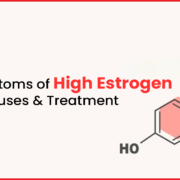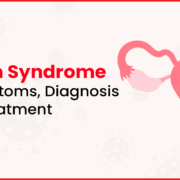Ovarian Cyst – Symptoms, Causes & Treatment
What is Ovarian Cyst
Ovarian cysts are fluid-filled sacs on the ovaries, a female reproductive system’s part. An ovarian cyst is a common issue in women, and it’s assumed that most women will get it once. Although most ovarian cysts are typically harmless and often resolve without any medical intervention, some can cause discomfort and pain, and in rare cases, they can become cancerous.
This blog post aims to provide a comprehensive overview of ovarian cysts, covering their symptoms, causes, types, diagnosis, and treatment options. It will also cover some potential complications of ovarian cysts and ways to prevent them. By reading this post, you will gain valuable information about ovarian cysts and how they can be effectively managed to improve your overall health and well-being.
Ovarian Cyst Symptoms
All ovarian cysts’ symptoms can differ depending on the size, type, and location. Some women may not experience symptoms, while others may have one or more of the following symptoms. It’s essential to note that these symptoms may also be related to other health issues, and only a healthcare provider can accurately diagnose an ovarian cyst. Women who face these symptoms need medical help to determine the leading cause.
- Pain and discomfort: One of the most common symptoms of an ovarian cyst is pain, which can range from dull to sharp. The pain is typically felt in the pelvis. It’s important to note that while pain is a common symptom of an ovarian cyst, it can also be associated with various other conditions.
- Changes in the menstrual cycle: Some women can experience changes in their periods.
- Bloating and fullness: Ovarian cysts can cause pressure in the lower abdomen and bloating.
- Other possible symptoms: Other symptoms that may be associated with ovarian cysts include:
- Difficulty urinating or frequent urination
- Pain during bowel movements
- Breast tenderness
- Nausea or vomiting
- Weight gain
- Fatigue
It’s essential to note that while the symptoms mentioned in this post are common indicators of ovarian cysts, they can also be caused by other health conditions. As a result, it’s essential to seek medical attention from an IVF expert if you’re experiencing any of these symptoms.
What are the Causes of Ovarian Cysts?
There are several potential causes of ovarian cysts, including:
- Hormonal imbalances: Ovarian cysts can develop due to hormonal imbalances, such as excess estrogen or androgen hormones.
- Polycystic ovary syndrome is a medical condition in which the ovaries produce high androgen hormones, which can lead to the formation of multiple small cysts on the ovaries.
- Endometriosis is a medical condition where the lining tissue of the uterus grows outside, which can cause ovarian cysts when it grows on ovaries.
- Pregnancy: Ovarian cysts can sometimes form during pregnancy, typically in the first trimester, due to changes in hormone levels.
- Other possible causes: Ovarian cysts can also be caused by many medical conditions or fertility drugs.
Ovarian cysts can develop without any known cause. It’s important to note that having an ovarian cyst does not necessarily mean a person has cancer. Still, having any ovarian cysts evaluated by IVF experts to rule out any underlying severe conditions is essential.
What are the Types of Ovarian Cysts
There are different types of ovarian cysts, which are:
- Functional cyst: Follicular and corpus luteum cysts are various functional cysts that perform like normal ovaries.
- Dermoid cysts: These cysts are the form of cells that produce human eggs and contain various tissues.
- Cystadenomas: These are formed from cells on the upper layer of the ovary and are filled with watery or mucous-like fluid.
- Endometriomas: These are cysts that form due to endometriosis.
It’s important to know that some ovarian cysts may need treatment while others must resolve themselves. It is essential to look for a healthcare provider if you are facing these symptoms, as they need immediate treatment.
Diagnosis of Ovarian Cysts
The diagnosis of ovarian cysts typically involves a combination of different methods, including:
1: Physical examination: A healthcare provider may conduct a pelvic exam to check for any signs of tenderness or swelling in the ovaries.
2: Ultrasound: This technique uses sound waves to make images, which can help recognize a cyst and provide information about it.
3: Blood tests: Blood tests may be performed to measure hormone levels or detect tumour markers and substances produced by specific cancer cells.
4: Other diagnostic tests: Depending on the type and characteristics of the cyst, additional tests may be recommended, such as a CT scan, MRI, or biopsy. These tests can help provide more detailed information about the cyst and determine if it is cancerous or noncancerous.
It’s important to note that not all ovarian cysts require treatment. Still, a healthcare provider will typically recommend follow-up testing and monitoring to ensure that the cyst is not causing any complications or growing in size.
What can be the Preferred Ovarian Cysts Treatment?
Treatment of ovarian cysts can vary depending on many factors, like type and the size of the cyst, the presence of any symptoms, and the patient’s health and age. Treatment options may include:
- Watchful waiting: Small, noncancerous ovarian cysts may not require treatment and may resolve independently over time. In these cases, a healthcare provider may recommend watchful waiting and regular monitoring to ensure the cyst does not grow or cause complications.
- Medications: Hormonal birth control pills or other hormone therapies may be used to regulate hormonal imbalances that can contribute to developing ovarian cysts. Pain relievers can also be recommended in pain.
- Surgery: Surgery may be necessary if a cyst is significant and causing pain. The type of surgery will depend on the characteristics of the cyst, but options may include laparoscopy or laparotomy to remove the cyst or the affected ovary.
- Ovarian cystectomy is a surgical process that includes removing the cyst while preserving the ovary. It is typically performed in cases where the cyst is small and noncancerous, and the individual wishes to maintain their fertility.
- Oophorectomy: This surgical procedure involves removing the affected ovary and may be recommended in cases where the cyst is large, cancerous, or causing significant pain or discomfort.
What are Preventions for Ovarian Cysts?
It is not always possible to prevent the development of ovarian cysts, as they can occur naturally and for various reasons. However, some steps can reduce developing ovarian cysts, including:
- Hormonal birth control: Taking hormonal birth control, such as the pill or the patch, may help regulate the menstrual cycle and reduce the risk of developing functional cysts.
- Regular gynaecological check-ups: Regular visits to a gynaecologist help detect the presence of ovarian cysts early on before they become problematic.
- Keeping a healthy weight: Being obese can grow the risk of developing ovarian cysts. Having a healthy weight through a healthy diet and exercise can help decrease the risk.
- Managing underlying medical conditions: Certain medical conditions, such as endometriosis and PCOS, can increase the risk of developing ovarian cysts.
- Avoiding exposure to toxins: Certain toxins, such as cigarette smoke and certain chemicals, may increase the risk of developing ovarian cysts. Avoiding these toxins can help decrease the risk.
These steps can help reduce developing ovarian cysts, but they do not guarantee that cysts will not grow. It is essential to be aware of the signs and symptoms of ovarian cysts and seek medical attention if any symptoms arise.
What Size of Ovarian Cyst is Dangerous?
Any ovarian cyst that causes symptoms such as pain, bloating, or changes in the menstrual cycle, regardless of its size, should be evaluated. Additionally, ovarian cysts that are larger than 5 centimetres in length or that continue to grow should be closely monitored and may require further evaluation or treatment.
Conclusion
Ovarian cysts are an ordinary condition that affects every woman. While many cysts are minor and do not cause symptoms, some can grow larger and cause pain or discomfort. It’s essential to seek medical attention if you experience any symptoms of ovarian cysts, as early detection and treatment can help prevent complications and improve outcomes.
At Imprimis IVF, we understand ovarian cysts’ impact on a woman’s fertility and overall health. Our experienced team works closely with every patient and develops a personalized treatment plan accordingly.










